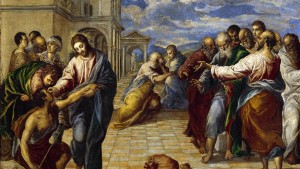Fr Neil’s homily at Mass on the Fourth Sunday in Lent, 22 March 2020
Jesus said, “I am the light of the world”
Our Lord encounters a man born blind and is asked if his blindness is due to sin, either his or his parents’. Jesus emphatically says that, no, this kind of blindness is not due to sin but in fact will glorify God.
Our Lord’s manner of healing the man may seem strange to us. Why would he spit into the dust to make a clay and put it into the blind man’s eyes? He could obviously have just spoken the word as he did for the centurion’s servant or the ten lepers. This isn’t a case of bad social manners. For those steeped in Jewish tradition his actions were clear.
In our Ash Wednesday mass at the imposition of the ashes the minister say; “From dust you came and unto dust you shall return: repent and believe the gospel.” In these words one of the things we are being reminded of is the creation story when God got down into the dust to form humanity. Jewish tradition elaborates and speaks of God spitting into the dust to form the clay from which humanity was made. Their common phrase was “you are made of spittle and dust.” The healing also takes place on the Sabbath, the holy day given by the Lord after he had completed his act of creation.
Therefore, in the manner of this healing, our Lord is revealing his divine authority, to those who pick up the signs he is performing. The man born blind has new eyes created from the spittle and dust — a sign of recreation and the reserve of God alone.
During this long episode of the man born blind, the gospel is teaching us about what true blindness (excuse the pun) really looks like. The healed man not only recovers his physical sight but also recovers a growing illumination of spiritual realities. In the man’s dialogue with the Pharisees he reveals his burgeoning understanding: first by stating that Jesus must be a prophet, then a man approved by God because God doesn’t perform miracles through a man separated from him by sin, and finally in response to our Lord revelation of himself states, ‘“Lord I believe,” and worshipped him.’
This man’s growing understanding stands in sharp contrast to the Pharisees who ought to know the ways of God, but refuse to see what is before their eyes. They first don’t believe he is the man born blind; they cannot see the gift for the fact that it happened a sabbath. Then they belittle the man for pointing out that only through God can these sorts of miracles happen, when they wished to portray Christ as a sinner.
In complete contrast to the man born blind, the pharisees’ spiritual blindness and refusal to believe that Jesus is the light of the world is a blindness caused by their own sin of which they are guilty and for which they are responsible.
Samuel, from our first reading, listening to the Lord, rejects all Jesse’s older sons for the youngest. From a human perspective it is the most unlikely one, David, whom the prophet anoints as King. God sees to the heart of man. The Pharisees, for their part, couldn’t see beyond mere appearances to what lay beneath the surface — they were blind to the deeper truth and greater realities of the God-man who stood before them.
Jesus said, “I am the light of the world.” He invites us to believe who and what he is so that we might, in his light, see things for what they really are. We have to trust and believe so that we might see the deeper truths about ourselves and the world within which we live. Only then will we find consolation and feel secure despite what might be happening around. This seems to be especially relevant in as we face the crisis of the coronavirus and the total disruption to our normal pattern of living out our lives and faith.
On one hand, worry and anxiety leads to wild imaginations and selfish and thoughtless acts of panic buying. On the other, the refusal to take seriously the potential dangers pushes us to ignore what is before us and act in an irresponsible way towards others’ vulnerability.
There seems to me to be a invitation to open up new doors of spiritual practice that could lead to a deepening of our relationship with our Lord, a greater thanksgiving for the things we might have taken for granted, and a new wonder of the beauty of the mass. It also give us a chance to put into practice in a concrete way the means by which we might love our neighbours.
Allowing ourselves the opportunity to be drawn deeper into the light of Christ illuminates the possibilities and path through this crisis by asking our Lord — as that great Newman hymn has it — to lead us on:
Lead, kindly light, amid the encircling gloom,
Lead thou me on;
The night is dark, and I am far from home;
Lead thou me on;
Keep thou my feet; I do not ask to see
The distant scene: one step enough for me.
Video via YouTube ![]()








 Posts
Posts